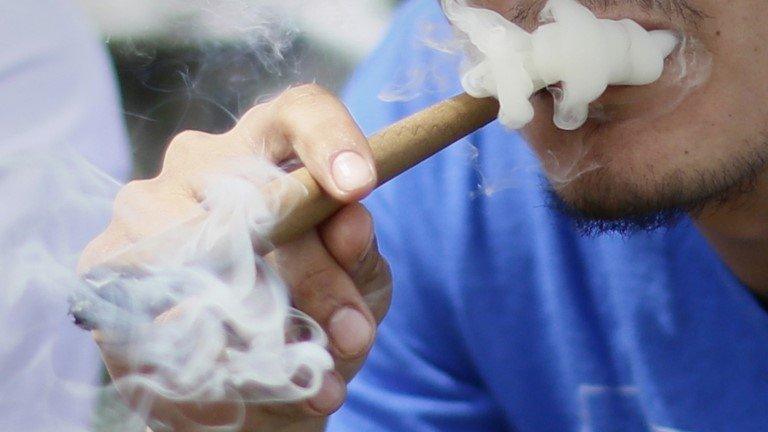Colorado's marijuana firms beg banks to take their cash
- Published
Elan Nelson from Medicine Man gives a guided tour of a legal marijuana factory in Denver, Colorado
Elliot Klug isn't in the security business - but he may as well be.
"Let's just say we have a couple of armed staff," he says.
The owner of Pink House, a marijuana dispensary in Denver, Colorado, Mr Klug has armed his employees because he has been unable to find a bank that will accept the thousands of dollars of cash he takes in each day since recreational cannabis became legal in Colorado on 1 January.
"Even armoured cars have been told not to do business with us," says Mr Klug.
That's because while Colorado has legalised cannabis, most banking institutions are governed by federal laws which make it a crime to take money from firms engaged in the cultivation and sale of what is technically still an illegal drug.
While the Obama administration has recently attempted to convince banks that it will not prosecute them for doing business with Colorado's firms, issuing new guidance just last week, the banking industry remains unmoved.
"An act of Congress is the only way to solve this problem," says Colorado Bankers Association president Don Childears, who says he has continued to advise banks to refuse cannabis cash out of fear of money-laundering charges.
But in an industry that is projected to grow, external to $10.2bn (£6.1bn) by 2018, the question remains: what to do with all that cash?
'We were not drug dealers'
While the sale of recreational cannabis has been legal in Colorado only since the beginning of the year, medicinal marijuana has been legal for over a decade.
And for most of that time, those "ganja" firms had access to legal banking, including Simply Pure, a medicinal marijuana edibles business.

Scott Durrah and Wanda James were forced to close down their edible marijuana firm in 2012
"While everybody else was still focusing on brownies and cookies we took it a step further. We did marinara sauce, green chillies, mango salsa, peanut butter," says Wanda James, who co-founded the firm in 2010 with her husband Scott Durrah.
"There's really only so many brownies you can eat in a given week."
Within a year, they were doing business with more than 400 dispensaries in the US.
But that all came to a screeching halt in 2012, when Wells Fargo suspended their bank account.
"They said we're ending all relationships with anybody doing anything with cannabis. Even though they were clear as to who we were - we were not drug dealers or cartel members," recalls Ms James.
They were forced to close the firm months later.
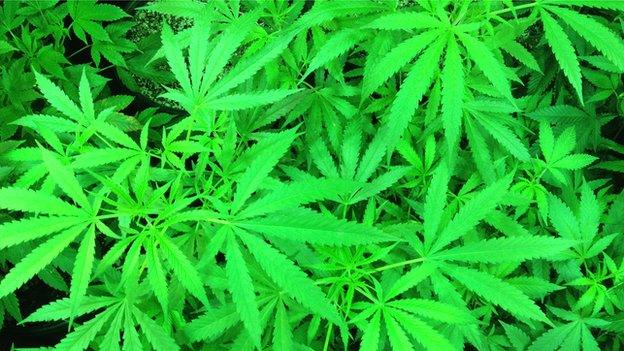
Cannabis firms are projected to make close to $1bn a year - not enough for banks to compete for their cash
Not a high priority
For a while, "there was an environment where some banks did [accept business from] cannabis firms, probably unknowingly because none of us really focused on the issue. Once it was surfaced by the Department of Justice then everybody started getting concerned," explains Mr Childears.
Colorado's new, legal marijuana companies cannot get finance because the Federal government still considers cannabis illegal
"I think the end result was most people have concluded that banks can't be in this business."
And banks have been unmoved by the Obama administration's seemingly supportive stance, noting that the Department of Justice has issued four different positions on banks and cannabis in the past two years.
"We need more permanence than that. We need to know this is going to last for years," says Mr Childears.
The problem is that the executive branch - the one that Mr Obama controls - is not the one that dictates banking laws and regulations.
Bankers fear not just jail, but also the suspension of their banking licences and steep penalties if they are caught violating these laws, most notably the Bank Secrecy Act and the Anti-Money Laundering Act, external, which are designed to prevent money laundering.
Also, while the marijuana industry is projected to grow into a booming business, it isn't yet. It's worth $1bn a year - banks in Colorado take in more than $100bn.
"Quite honestly banks don't care a lot right now - it's not a high priority for them at this point in time," says Mr Childears.
'Third-class citizens'
Medicine Man Denver is one of the biggest operators in the area. Its warehouse lies on an unassuming industrial stretch but inside, the 20,000 sq ft (1,850 sq m) facility is essentially a weed factory.
A security guard greets customers, asking "Medical or recreational?" before asking to see some ID to prove they are over 21.
At lunchtime on a recent Thursday, the line of buyers was nine deep, and included middle-aged couples, tourists from Texas, and a few tried-and-true types.
Each day, the firm does thousands, if not hundreds of thousands, of dollars of business.

Sally Vander Veer says cannabis firms are a legitimate industry but are not treated like one
Although for a while they were forced to forgo banking support, they are one of many firms here that have quietly worked out an agreement with a local bank.
But it is still not ideal: the bank will not provide loans.
"It's costly banking and it's liable to go away at any point," says Sally Vander Veer, who runs the firm with her two brothers.
So Medicine Man constantly plans for what would happen if it had to go back to being an all-cash firm, even as it expands its operations to encompass 40,000 sq ft.
"It's really tough - we're a legitimate industry, we have been written into the constitution of Colorado and yet we're still treated as third-class citizens on many levels," says Ms Vander Veer.
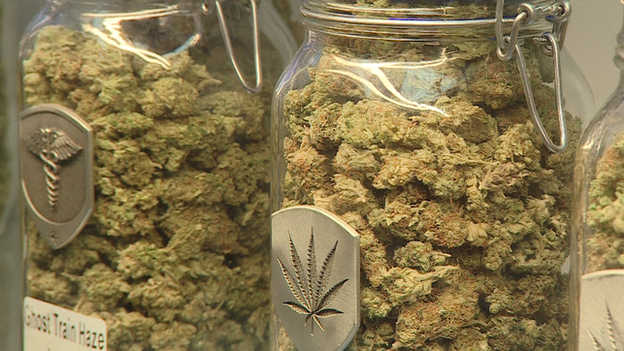
At Medicine Man, one half of the dispensary is for recreational marijuana; the other side is for medicinal
It is a sentiment echoed by Wanda James, who says she and her husband remain committed to restarting Simply Pure one day.
"The state of Colorado has received over $20m of revenues and yet they can take that money and deposit it into their bank. But we can't deposit the same money into our bank," she says.
"The minute we can have a real business with access to capital and credit cards we will be back."
But with Congress divided and banks digging in, it looks like cannabis in Colorado will remain in the weeds for a time to come.
- Published14 February 2014
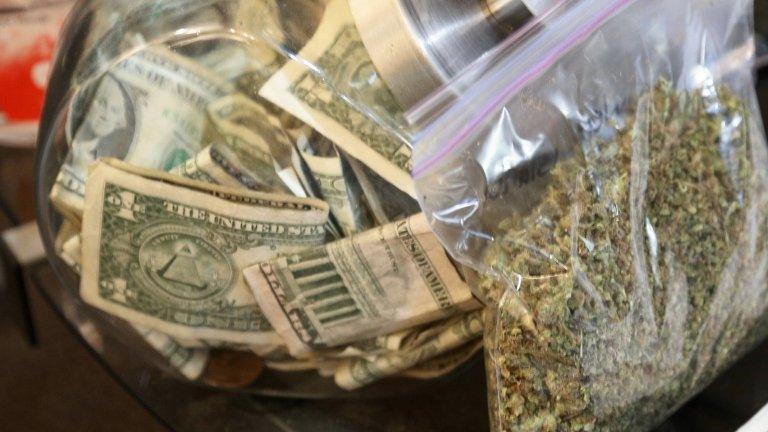
- Published5 February 2014
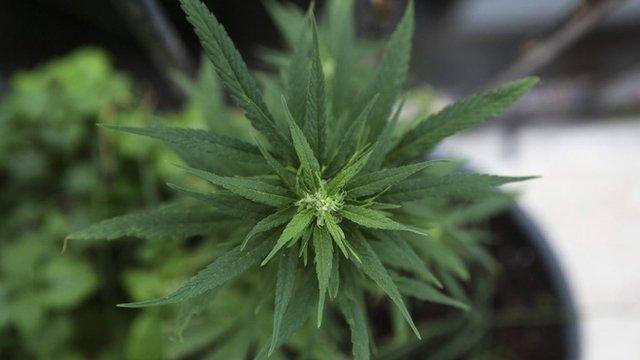
- Published30 January 2014
